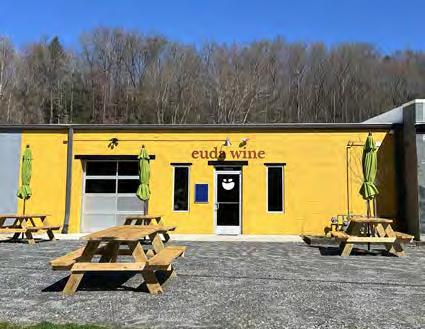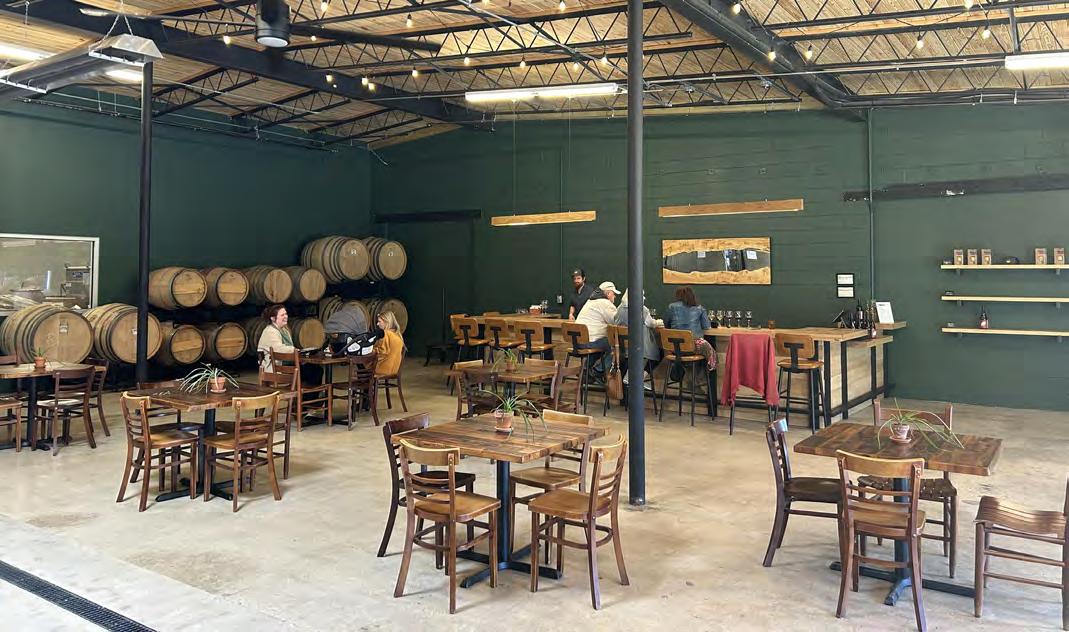
7 minute read
Unveiling the Visionaires of euda wine
BY DATHAN KAZSUK AND JENNIFER PRIMROSE
Photos by Dathan Kazsuk and Jennifer Primrose
Meet the dynamic duo behind Old Fort’s euda wine, where the husband and wife team Michael and Abi McGeary bring their unique backgrounds and passions to the forefront of winemaking.
With a restaurant industry foundation, Michael embarked on a wine career. Meanwhile, Abi, hailing from Louisiana and seasoned in social work and therapy, seamlessly juggles her day job with actively contributing to euda wine’s operations and event planning.
In 2022, this dynamic pair made a significant move to Old Fort, driven by a shared vision of capturing the essence of eudaimonia in their winemaking venture. euda wine isn’t just about crafting exceptional wines; it’s a commitment to sharing the joy of wine with the local community, embracing a down-to-earth, no-nonsense approach to the art of winemaking.
Tell us how you got into the fabulous world of wine and opened North Carolina’s newest winery there in Old Fort. So, I initially worked in restaurants right out of college. I was working in Aspen, which is a ski town, and that’s where I actually got into wine.
I had a manager who promoted us learning about wine because we were selling wine at the restaurant. I pursued the sommelier route and got my certification there in Aspen. I was there a couple of years but wanted to know what my next steps were for me. I loved the restaurant life but didn’t like working nights and weekends.
Around that time, I met a gentleman who was in town at the bar, and we got to talking. He was from Napa and in town doing sales, and he pitched this idea to me: working a harvest and getting into winemaking. So I thought about it for a couple of weeks and reached back out to him and told him I wanted to take him up on his offer—and he connected me with a winemaker in Napa. I quit here, and in two weeks, I was up in Napa working a wine harvest.
That’s so great. To be young and able to move from Colorado to California in two weeks and work a wine harvest. I must admit, the first couple of weeks were rough because we were bottling. Anyone who’s done production knows that bottling is not always the most fun thing to do. But it was unique to work and create something you can put in someone’s hand at the end of the day.
This time in California was at Girard Winery, but you also spent some time learning abroad as well, correct? I moved out there in 2012 and was there for about four years, but during that time, I left for two different stints to work abroad. In 2013, I went to New Zealand, returned to Girard, and left again that following Spring to go to South Africa. When I returned from South Africa, I realized this was what I wanted to do for my career.
I spent those next two years working at Girard and taking classes at the local community college in Napa to get the prerequisites because I was a philosophy undergrad. So, after two extra years in Napa, I got into a program in Switzerland in 2016 and spent two years there getting my Master’s. I worked a little in Switzerland, and upon returning to the U.S., I did a harvest in Chile before going to Virginia.
Where did you spend time in Virginia? I got to Virginia in 2018 and worked for over a year at King Family Vineyards in Charlottesville as the assistant winemaker. Then, in 2019, I became head winemaker at Rockland Farm Winery in Maryland. So, I moved to Maryland and was there for three years before my wife and I moved back to North Carolina.
Being originally from Durham, did you want to return to your roots and try winemaking here in North Carolina? The home roots did play a huge role. I’ve always loved North Carolina, growing up here.
Considering your extensive experiences in California and Virginia, regions that are years ahead of North Carolina, especially in investing in the local wine industry, did you encounter any challenges when deciding to establish roots here, given the apparent disparity the state gives to our local wine scene? You are correct that the reality is that Virginia does have a more recognized reputation in wine than North Carolina right now. But when I told my friends I was leaving California and going to Virginia, they were all like, ‘What are you doing going to Virginia? Come to California, that’s where you really make wine.’ But you get to Virginia, and you’re like, these people have a lot of knowledge. Then, when I was leaving Virginia to head to North Carolina, people were telling me, ‘What are you doing? They don’t know how to make wine there. Stay in Virginia.’



It’s my nature to build rather than stay in an established place, and North Carolina already has many good wineries. Still, it feels a little more on the ground floor of an industry that is really building up, and it’s a little more exciting and fruitful at the end of the day.
Your winery is located in Old Fort. It is a growing small town and very close to Asheville. When we were looking for a property, we knew we wanted to be in Western Carolina, and realistically about 45 minutes from Asheville. We were eyeing a few different towns, but ultimately, we found Old Fort and liked it.
How would you describe your winemaking style? What would you say makes you different from all the other state winemakers? Speaking of style, I’m inspired by Old World or European style, which is basically the wines make themselves. That’s overstated because there’s always something that goes into winemaking. But generally speaking, I try to do the least amount of stuff I can in the winery. All our fermentations are spontaneous and are minimal to what we do in the cellar with filtering and additives.
Currently, you are sourcing your fruit, and we will discuss that next. But do you have any thoughts on planting vines on-site or having your own vineyard? My joke to everyone is when you start talking to investors and banks about vineyards, their eyes start rolling in the back of their heads, and they start foaming at the mouth because it’s such a financial undertaking. I would love a vineyard, and I’ve previously managed vineyards. In winemaking, you need to start with the best grapes possible, and the best way to do that is to farm and own a vineyard and manage it how you want. We need the business to get rolling before taking on that investment.
So, who are you sourcing from? Are you keeping it all here within the state? We’re sourcing from a few different vineyards in North Carolina, primarily from Yadkin Valley. But we are also trying to build relationships here more locally.
Tell us about your available wines. We’ll have seven wines. We’ll have three sparkling wines, one white wine, two red wines and one carbonic red. Then, in a couple of months, we’ll have some of the 2023 vintage that will include a Sauvignon Blanc, Riesling, and a Rosé from Merlot.










